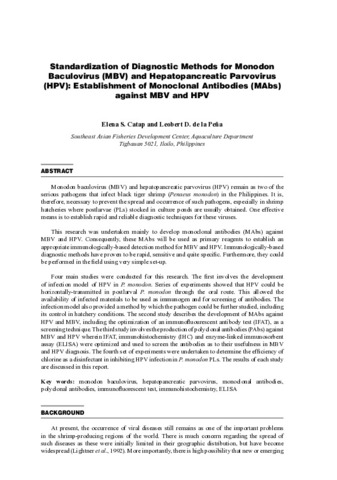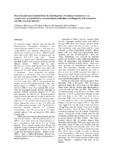Standardization of diagnostic methods for monodon baculovirus (MBV) and hepatopancreatic parvovirus (HPV): Establishment of monoclonal antibodies (MAbs) against MBV and HPV
- Global styles
- MLA
- Vancouver
- Elsevier - Harvard
- APA
- Help

วันที่
2005-03Page views
1,354ASFA keyword
AGROVOC keyword
Taxonomic term
เมตาดาต้า
แสดงระเบียนรายการเต็ม
Share
นามธรรม
Monodon baculovirus (MBV) and hepatopancreatic parvovirus (HPV) remain as two of the serious pathogens that infect black tiger shrimp (Penaeus monodon) in the Philippines. It is, therefore, necessary to prevent the spread and occurrence of such pathogens, especially in shrimp hatcheries where postlarvae (PLs) stocked in culture ponds are usually obtained. One effective means is to establish rapid and reliable diagnostic techniques for these viruses.
This research was undertaken mainly to develop monoclonal antibodies (MAbs) against MBV and HPV. Consequently, these MAbs will be used as primary reagents to establish an appropriate immunologically-based detection method for MBV and HPV. Immunologically-based diagnostic methods have proven to be rapid, sensitive and quite specific. Furthermore, they could be performed in the field using very simple set-up.
Four main studies were conducted for this research. The first involves the development of infection model of HPV in P. monodon. Series of experiments showed that HPV could be horizontally-transmitted in postlarval P. monodon through the oral route. This allowed the availability of infected materials to be used as immunogen and for screening of antibodies. The infection model also provided a method by which the pathogen could be further studied, including its control in hatchery conditions. The second study describes the development of MAbs against HPV and MBV, including the optimization of an immunofluourescent antibody test (IFAT), as a screening technique. The third study involves the production of polyclonal antibodies (PAbs) against MBV and HPV wherein IFAT, immunohistochemistry (IHC) and enzyme-linked immunosorbent assay (ELISA) were optimized and used to screen the antibodies as to their usefulness in MBV and HPV diagnosis. The fourth set of experiments were undertaken to determine the efficiency of chlorine as a disinfectant in inhibiting HPV infection in P. monodon PLs. The results of each study are discussed in this report.
การอ้างอิง
Catap, E. S., & de la Peña, L. D. (2005). Standardization of diagnostic methods for monodon baculovirus (MBV) and hepatopancreatic parvovirus (HPV): Establishment of monoclonal antibodies (MAbs) against MBV and HPV. In K. Nagasawa (Ed.), Recent Advances in Diagnosis and Prevention of Fish and Shrimp Diseases in Southeast Asia (pp. 27–28). Tigbauan, Iloilo, Philippines: Aquaculture Department, Southeast Asian Fisheries Development Center.
Type
Book chapterISBN
9718511732
Related items
Showing items related by title, author, creator and subject.
-
Production of polyclonal antibodies (PAbs) against monodon baculovirus (MBV) and hepatopancreatic parvovirus (HPV)
Catap, Elena S.; de la Peña, Leobert D. (Aquaculture Department, Southeast Asian Fisheries Development Center, 2005-03)Monodon baculovirus (MBV) and hepatopancreatic parvovirus (HPV) are two of the viral pathogens, which infect penaeid shrimps in the Philippines. Polyclonal antibodies (PAbs) to MBV and HPV were raised by immunization of ... -
Development of monoclonal antibody (MAb) against monodon baculovirus (MBV) and hepatopancreatic parvovirus (HPV)
Catap, Elena S.; de la Peña, Leobert D. (Aquaculture Department, Southeast Asian Fisheries Development Center, 2005-03)Antibody-based detection methods are relatively simple and rapid, aside from being specific and sensitive. Thus, there is a necessity to develop such techniques for early and rapid diagnosis of viral pathogens such as MBV ... -
Bacteria and toxin isolated from the dinoflagellate Pyrodinium bahamense var. compressum and production of monoclonal antibodies and diagnostic kits to monitor red tide and toxic mussels
Espino, T. M.; Aspiras, R. M.; Sabino, N. G.; Parreño, E.; Macasadia, R. L.; del Mundo, M. L. F. (Bureau of Agricultural Research, Department of Agriculture, 2007)Six bacterial isolates obtained from the red tide dinoflagellate Pyrodinium bahamense var. compressum were found to be toxic. The most toxic isolate MM-11 was cultured, characterized, and identified to be Micrococcus luteus. ...

 AQD Access
AQD Access




